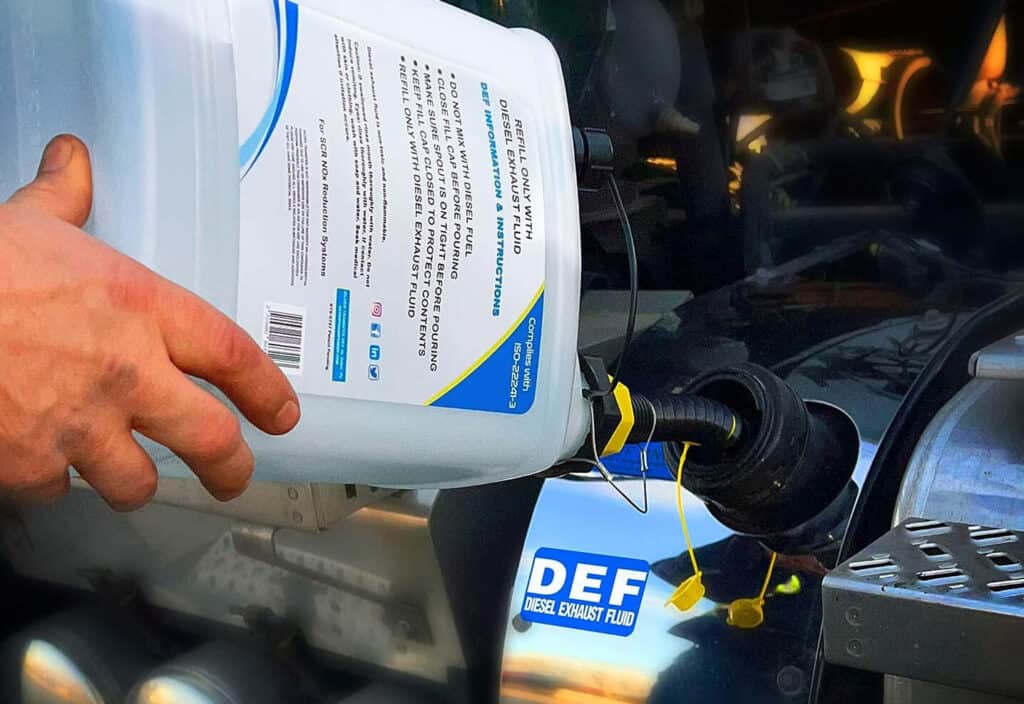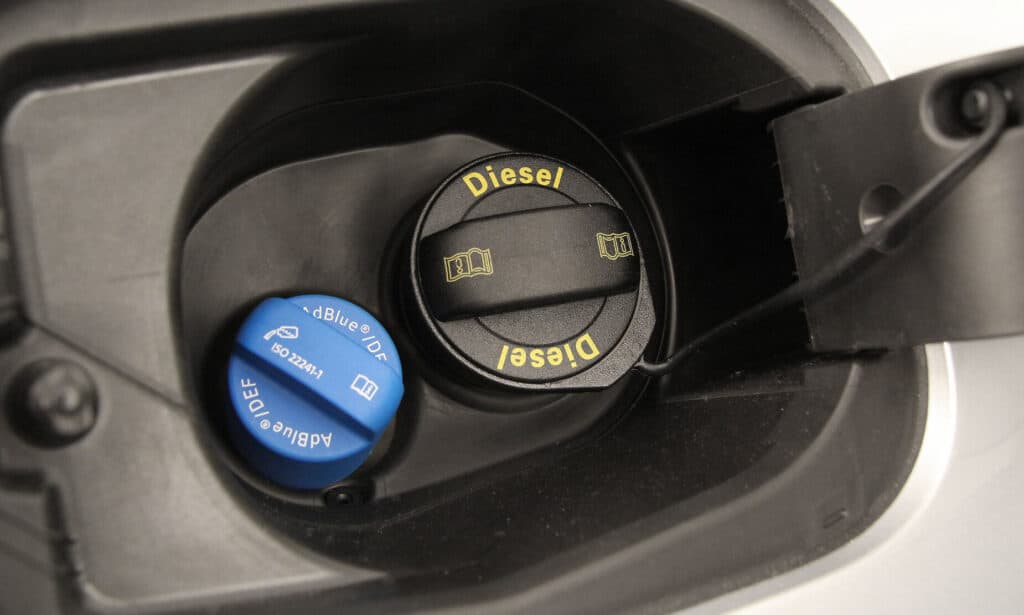What is Diesel Exhaust Fluid (DEF) and Why is it Needed?
Picture this: you’re driving your diesel vehicle, you feel the power, the purr of the engine, but you also know that diesel engines have been traditionally less friendly to our environment. Enter Diesel Exhaust Fluid (DEF). DEF is an essential part of modern diesel vehicles, which helps reduce harmful nitrogen oxide emissions from diesel engines. It’s a urea-based solution that breaks down dangerous NOx emissions into harmless nitrogen and water.
How Much Will it Cost to Refill Diesel Exhaust Fluid (DEF) in Canada?
A question that might be burning in your mind right now: “How much is this going to cost me?” Well, a typical DEF tank holds about 20-30 liters of fluid, and the cost of DEF in Canada varies, but on average you can expect to pay about $5 per liter. Therefore, a complete refill will cost around $100-$150 just for the fluid. If you’re getting it filled at a service station or using a mobile mechanic, you may need to add an additional $30 to $60 for labor, bringing the total to approximately $130-$210. The refill process is quick and should typically take about 30 minutes or less.

What are the Symptoms of Low DEF Levels or Exhaust Fluid System Malfunction?
• Warning Light Indicator: A prominent sign of low DEF levels or an exhaust fluid system malfunction is the illumination of the DEF warning light on the dashboard. This light typically appears when the DEF tank is nearly empty or if there’s a problem with the DEF system.
• Reduction in Vehicle’s Performance: In some vehicles, a malfunctioning exhaust fluid system or low DEF levels can result in reduced engine performance. The vehicle might go into a ‘limp-home’ mode, limiting speed to encourage immediate attention to the problem.
• Increased Emissions: DEF is crucial for reducing harmful emissions. So, if there’s a problem with the DEF system, or if the DEF level is low, the vehicle might produce higher levels of nitrogen oxides and particulate matter.
• Starting Issues: Some vehicles are designed not to start if the DEF level is extremely low or if there’s a severe system malfunction. This is to prevent damage to the vehicle and to maintain compliance with emission standards.
• Messages on the Instrument Cluster: A low DEF level or a system problem might trigger messages on the instrument cluster, advising you to refill the DEF tank or seek service.
How Long Does Diesel Exhaust Fluid (DEF) Last?
So how often should you expect to be refilling your DEF tank? The average diesel vehicle can travel about 800-1,000 kilometers per liter of DEF. Therefore, a full DEF tank can last for 16,000 to 30,000 kilometers, depending on the size of your tank and your vehicle’s fuel economy. However, DEF does have a shelf life of around two years if stored properly.
How Does Diesel Exhaust Fluid (DEF) Get Consumed?
• Engine Operation: DEF is used in the Selective Catalytic Reduction (SCR) system during normal engine operation to reduce harmful nitrogen oxide (NOx) emissions. The amount consumed is proportional to the amount of fuel the engine burns, so more DEF is used during periods of heavy load or high-speed driving.
• Vehicle’s DEF Dosing Strategy: The rate at which DEF is consumed can be affected by the vehicle’s DEF dosing strategy, which is set by the manufacturer. This strategy might vary based on factors like the engine load, temperature, speed, etc.
• Age and Quality of DEF: Over time, DEF can degrade, especially if it’s exposed to high temperatures or sunlight. This can affect its efficacy, possibly requiring more DEF to achieve the same emissions reductions.
• Driving Conditions: DEF consumption can also depend on your driving conditions. For example, stop-and-go city driving can use DEF at a different rate than steady, high-speed highway driving.
• Vehicle Type: Different vehicle types and models have different rates of DEF consumption. Larger, more powerful engines typically use more DEF than smaller, less powerful ones.
How Can Low DEF Levels or a Malfunctioning Exhaust Fluid System Affect the Vehicle?
• Performance Decrease: Vehicles with low DEF levels may enter a reduced performance mode, or “limp mode,” which decreases the vehicle’s power and speed to prevent excessive harmful emissions.
• Engine Shutdown: If the DEF tank is allowed to run dry, some vehicles will not start or will limit your speed severely, ensuring compliance with emission regulations.
• Increased Emissions: DEF is integral to reducing harmful NOx emissions in diesel vehicles. Low DEF levels can lead to an increase in these damaging emissions, leading to potential environmental harm.
• Potential Damage to SCR Catalyst: A malfunctioning exhaust fluid system may result in damage to the vehicle’s selective catalytic reduction (SCR) catalyst, leading to expensive repairs.
• Check Engine Light: Low DEF levels or a malfunctioning exhaust fluid system can trigger the check engine light or DEF warning light on your dashboard.
Is it Safe to Drive with Low DEF Levels or a Malfunctioning Exhaust Fluid System?
The question looming on your mind is probably, “Is it safe to drive with low DEF levels or a malfunctioning exhaust fluid system?” You might be relieved to hear that, in the short term, driving with low DEF levels may not present an immediate safety risk. Most modern diesel vehicles are designed with fail-safes to prevent significant damage. When the DEF level dips below a certain point, your vehicle will typically enter a reduced power mode. This “limp mode” allows you to continue driving but with decreased performance, ensuring that excessive emissions are not being released due to inadequate DEF.
However, it’s crucial to remember that this is not a long-term solution. If the DEF levels are allowed to deplete fully, most vehicles will prevent starting to ensure compliance with emission regulations. At the same time, a malfunctioning exhaust fluid system can lead to the build-up of harmful NOx emissions in your vehicle’s exhaust system. This build-up can potentially damage the selective catalytic reduction (SCR) catalyst, an essential component in reducing harmful emissions. This kind of damage can lead to expensive repairs. So, while it might be safe in the short term, continuing to drive with low DEF levels or a malfunctioning system can lead to more significant problems in the long run.

How Can I Make My Diesel Exhaust Fluid (DEF) Last Longer?
• Regular Vehicle Maintenance: Regular service can ensure that your vehicle’s DEF system is working correctly and efficiently.
• Good Driving Habits: Aggressive driving can lead to higher fuel and DEF consumption. Maintaining a steady speed can improve your DEF usage.
• Proper Storage: DEF should be stored in a cool, dry place away from direct sunlight to maintain its quality.
Can a Mobile Mechanic Refill Diesel Exhaust Fluid (DEF)?
Absolutely! Mobile mechanics can bring DEF to your location and refill the tank for you. This service can be incredibly convenient, especially if your vehicle is in reduced power mode or unable to start due to low DEF levels.
Conclusion: Importance of Proper Diesel Exhaust Fluid (DEF) Refill
In the end, maintaining a proper level of DEF in your diesel vehicle is not just about avoiding repair costs or inconvenient breakdowns. It’s about ensuring your vehicle’s optimum performance, meeting environmental responsibilities, and complying with emission regulations. Remember, your vehicle, your environment, and your wallet will thank you for timely DEF refills!
Next Steps
Book Your Diesel Exhaust Fluid Refill Service
The service most frequently booked by those who read this article is Diesel Exhaust Fluid Refill. Uchanics’ expert technicians make the process even more convenient by bringing the service right to your doorstep. We perform this job at your home or office, covering over 40 cities in Ontario, including Oshawa, Ajax, Toronto, Scarborough, Mississauga, Brampton, and more. Our commitment to excellence has earned us more than 700 glowing 5-star reviews. Choose Uchanics for your Diesel Exhaust Fluid Refill and experience unparalleled convenience and top-quality service.
